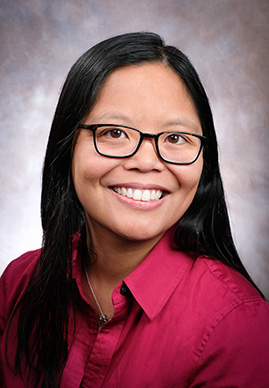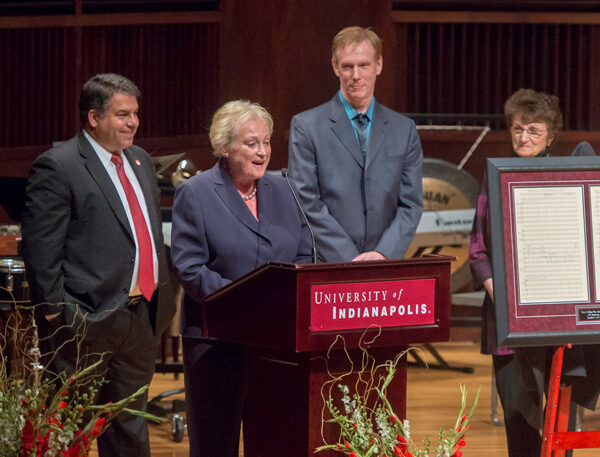The momentum generated by Commencement continues throughout the month of May with the University’s observance of Asian American & Pacific Islander (AAPI) Heritage Month. The observance pays tribute to the generations of Asian Americans and Pacific Islander Americans who have enriched our country’s history and who play a critical role in its future success. The University of Indianapolis Office of Inclusion & Equity is organizing the observance of AAPI Heritage Month at the University.
The observance was officially legislated first as Pacific/Asian American Heritage Week (taking place during the first ten days in May) in 1978 by President Jimmy Carter and extended to a month in the 1990s by President George H.W. Bush. The term “Asian American” itself came into use in the 1960’s, explains Leah Milne, assistant professor of English.
“The term is meant to be a pan-ethnic term that encompasses many nationalities. At that time in the 1960’s, this was very strategic,” she said, pointing out the civil rights movements that were happening around that time. “It began with the impulse to drive attention to Americans who have been previously marginalized or historically underrepresented.”
The Asian American & Pacific Islander term encompasses Americans who hail from vast geographical areas, along with their diverse peoples, languages and cultures, including dozens of countries in Eastern Asia, South Central Asia, Southeastern Asia, Western Asia, and some 30,000 islands in the Pacific Ocean. Milne notes that the Pacific Islander aspect of AAPI, which includes native Hawaiians, “often gets marginalized within that group, and that some Asian groups also get marginalized among Asian Americans, so it’s important to recognize every part of that designation.”
The contributions of immigrants from these diverse backgrounds have historically been overlooked or unacknowledged in the United States. Milne observed the example of Chinese immigrants, who were largely responsible for the construction of the first Transcontinental Railroad, nearly being written out of that history. The movement around the heritage month sought to rectify these intentional omissions, and also focused on the need to secure their rights as American citizens.
“They recognized that this was a way they would gain rights and recognition,” Milne said. “There’s this narrative of Asian Americans and Pacific Islanders as being invisible and part of the goal of the month is to highlight their contributions and achievements.”
Milne is a first-generation American and first-generation college student whose parents immigrated from the Philippines to the U.S. in the early 1970s. Filipino-Americans are the third-largest subgroup in the U.S. AAPI population, according to the U.S. Census.
“I’m very proud of what my mom and dad did to be successful here. My father served in the Coast Guard for decades. He served his country and he’s very proud of that,” Milne said, noting that Filipino-Americans have been an influence in North America since the late 1500s.
She also pointed out the long and complex relationship between the United States and the Philippines.
“The United States colonized the Philippines. When we’re talking about the disparate stories of Asian Americans, one of the distinctions with Filipino-Americans is that they are living in the country that colonized their country of origin,” she said, adding that Filipinos were initially allowed to work in the United States – with many serving in the U.S. military in various capacities – without access to citizenship. That policy changed in the mid-1940s, and the legacy and culture of Filipino-Americans remain an influential force in the United States.
UIndy launches Race and Ethnic Studies Minor
AAPI Heritage Month and the University’s observance of Juneteenth the following month provide an opportune moment to explore the University of Indianapolis’s new Race and Ethnic Studies minor, which will be offered for the first time in Fall 2021. Organized by Leah Milne, the Race and Ethnic Studies minor equips students to address the impact of race and culture in shaping institutions, social relations, and identities. Students will examine the historical foundations of the social construction of race and how this construction continues to impact society today, and learn how to understand the implications of race and ethnicity in order to critique, better navigate, and help improve institutional and societal approaches to difference.
“The pandemic has made it painfully clear how important it is to know the history of marginalized groups in this country,” Milne said. “It’s part of everything we do, whether we realize it or not. If we’re looking at any particular field, whether it’s nursing, law, sociology or history, there’s a way in which that story is different if we look at it through the lens of any one ethnic group. All students benefit from learning about this history, but especially students who have never seen themselves in a textbook before.”
About Leah Milne
Milne teaches courses on multiethnic literature in the Department of English. She recently received a grant from the National Endowment for the Humanities (NEH) for a summer institute entitled Hurston on the Horizon. In addition to the financial support, the grant gives Milne the opportunity to participate in a summer institute in July on author Zora Neale Hurston. Her new book, “Novel Subjects: Authorship as Radical Self-Care in Multiethnic American Narratives” will be published in July 2021. The book, based on Milne’s dissertation, offers a new way to look at multicultural literature by focusing on scenes of writing in contemporary works by authors with marginalized identities.
Learn more
Recommended reading
- “The Making of Asian America: A History” by Erika Lee
- “Unfamiliar Fishes” by Sarah Vowell
- “We Hereby Refuse: Japanese American Resistance to Wartime Incarceration” by Frank Abe and Tamiko Nimura
- “Echoes of History: Chinese Poetry at the Angel Island Immigration Station” by Ying Diao (Smithsonian article)
- “Welcome To Chindianapolis: One of the largest populations of Burmese Chin refugees in the world lives on the south side of Indianapolis” by Susan Salaz and Steve Raymer (Indianapolis Monthly article)





